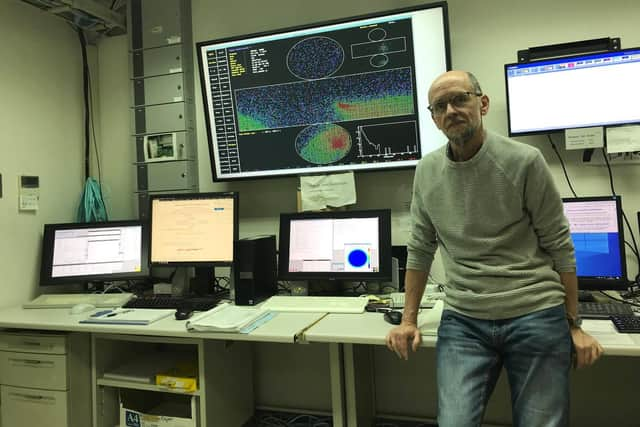Scientists make step towards unlocking secrets of the universe


A team of physicists from the University of Sheffield have produced innovative research to aid the understanding of why the universe is made of mostly matter and not antimatter, by studying the difference between the two.
Findings from the project indicate a difference between the fundamental behaviour of elusive elementary particles, neutrinos, and of antineutrinos – their antimatter counterparts.
Advertisement
Hide AdAdvertisement
Hide AdProfessor Lee Thompson, from the University of Sheffield’s department of physics and astronomy, said the research brings together particle physics and cosmology.


"By studying neutrinos, the most elusive of the elementary particles, we learn something about the largest of astrophysical topics, the universe itself,” he said.
The work is a large international collaboration of more than 350 scientists including the team from Sheffield.
As part of the research a special detector was used to observe neutrinos and antineutrinos which were generated 295 kilometres away at the Japanese Proton Accelerator Research Complex (J-PARC).
Advertisement
Hide AdAdvertisement
Hide AdAs they travel through the Earth, these particles oscillate between different physical properties known as flavours.
The research found a mismatch in the way neutrinos and antineutrinos oscillate by recording the numbers that reached the detector with a flavour different from the one they had been created with.
This difference is due to a so-called asymmetry in their physical properties.
The researchers say the project will help us understand the origin of the current prevalence of matter over antimatter in the universe.
Advertisement
Hide AdAdvertisement
Hide AdProfessor Thompson said: “Astronomers find that the matter in the universe is overwhelmingly just that: matter, with positively charged atomic nuclei surrounded by negative electrons.
“When particle physicists make new particles in accelerators, they always find that they produce particle-antiparticle pairs: for every negative electron, a positively charged positron.
"So why isn't the universe 50 per cent antimatter? This is a long-standing problem in cosmology – what happened to the antimatter?"
Professor Thompson is working alongside Dr Susan Cartwright and Dr Matthew Malek from the University of Sheffield’s department of physics and astronomy.
Advertisement
Hide AdAdvertisement
Hide AdThe measurements found during the experiment strengthen previous observations and pave the way towards future discoveries.
A new generation of experiments under construction, involving a team of particle physicists at Sheffield, might provide an answer to the problem of the missing antimatter in the next 10 years.
Editor’s note: first and foremost - and rarely have I written down these words with more sincerity - I hope this finds you well.
Almost certainly you are here because you value the quality and the integrity of the journalism produced by The Yorkshire Post’s journalists - almost all of which live alongside you in Yorkshire, spending the wages they earn with Yorkshire businesses - who last year took this title to the industry watchdog’s Most Trusted Newspaper in Britain accolade.
Advertisement
Hide AdAdvertisement
Hide AdAnd that is why I must make an urgent request of you: as advertising revenue declines, your support becomes evermore crucial to the maintenance of the journalistic standards expected of The Yorkshire Post. If you can, safely, please buy a paper or take up a subscription. We want to continue to make you proud of Yorkshire’s National Newspaper but we are going to need your help.
Postal subscription copies can be ordered by calling 0330 4030066 or by emailing [email protected]. Vouchers, to be exchanged at retail sales outlets - our newsagents need you, too - can be subscribed to by contacting subscriptions on 0330 1235950 or by visiting www.localsubsplus.co.uk where you should select The Yorkshire Post from the list of titles available.
If you want to help right now, download our tablet app from the App / Play Stores. Every contribution you make helps to provide this county with the best regional journalism in the country.
Sincerely. Thank you.
James Mitchinson
Editor
Comment Guidelines
National World encourages reader discussion on our stories. User feedback, insights and back-and-forth exchanges add a rich layer of context to reporting. Please review our Community Guidelines before commenting.